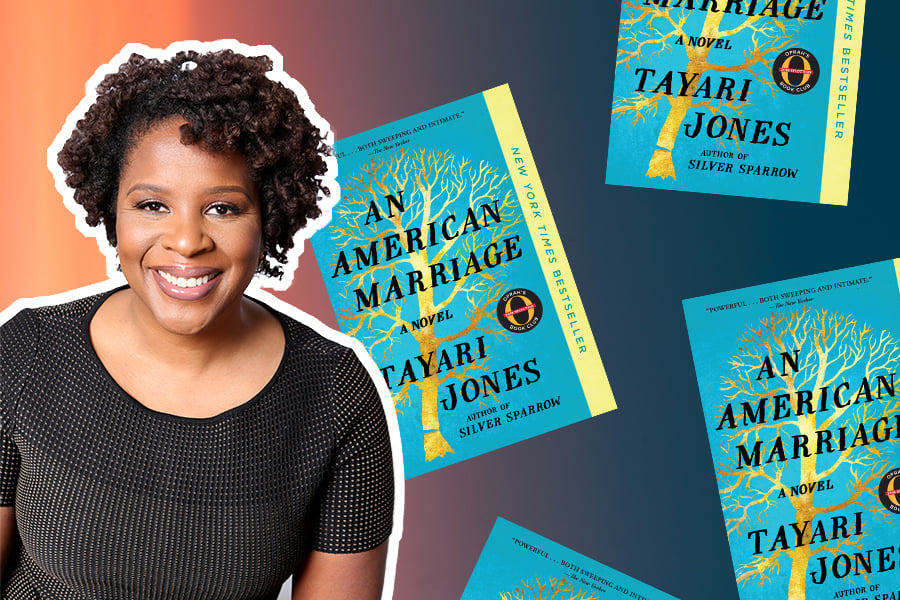Award-winning author Tayari Jones talks race, marriage and incarceration in Leon Forrest Lecture Series
Graphic by Meher Yeda. Photo courtesy Tyson Alan Horne.
Tayari Jones. Jones is the author of “An American Marriage” and was the featured speaker in Tuesday evening’s Leon Forrest Lecture Series.
May 11, 2021
Best-selling author Tayari Jones said her book “An American Marriage” is about the intersectionality of marriage and race.
As part of the annual Leon Forrest Lecture Series hosted by the African American Studies department, Jones was a featured speaker in the Tuesday evening event.
“Sometimes people ask me whether or not this is a love story, or if it’s a story about injustice or a story about race,” Jones said. “A big part of what I try to do in this book is to say that these things are not separate.”
The book, “An American Marriage,” follows a young woman, Celestial, and her husband, Roy, who was arrested for a crime he did not commit. Celestial struggles with their love, and part of the novel is told through letters between the two.
Jones began the event by briefly reading an excerpt from her book. Sociology and African American Studies Prof. Mary Pattillo, chair of the African American Studies department, said she enjoyed hearing Jones’ reading.
“There is nothing like the author reading their words,” Pattillo, an event moderator, said. “It reminds us that the difference between prose and spoken word is not that far.”
Pattillo, along with Ph.D. candidate Claudia Garcia-Rojas, moderated question and answer sections. They spoke on behalf of two book clubs who read “An American Marriage,” one in Evanston and the other through the Northwestern Prison Education Program.
Jones spoke about her personal ties to staging the book in Atlanta, as she was born and raised in the city. Although people often view the South as “grandmothers and mules,” Jones said she set out to write about the Atlanta she grew up in.
“I started writing stories about Atlanta because Atlanta is what I knew,” she said. “I work best when I’m just trying to write the south as I know it, because then I’m telling the truth because I’m not trying to save it from misconceptions.”
Jones was also asked about how she portrayed the concept of marriage and feminism in the book, especially in the context of having an incarcerated significant other.
She said she did not want to stick to people’s expectations of what the book’s plot would look like based on the title and a basic plot summary.
“If I say to you, ‘I’ve written a novel, and it’s about a woman and her husband is wrongfully incarcerated,’ people (think): one strong woman’s brave fight to free her man,” Jones said. “And when it doesn’t meet that expectation, it’s confusing.”
Jones said she chose to instead focus on the positive impacts of her book. She said one reader told her a similar situation happened in his family, but the book allowed him to “see his mother as a woman.”
Garcia-Rojas also asked Jones about the theme of incarceration in the book.
“Since George Floyd, people have been making the case that prisons don’t rehabilitate, they punish,” Garcia-Rojas said. “How do you see ‘An American Marriage’ fitting within the broader discourse on criminal justice reform?”
The book’s goal, Jones replied, is to underscore the humanity of incarcerated people. She said it’s important to battle the belief that “people want people to pay forever,” focusing on punishment rather than rehabilitation.
She emphasized she does not use the language “wrongfully incarcerated,” which implies there are “rightfully” and “wrongfully” incarcerated people, Jones said.
It took Jones six years for her to finish writing “An American Marriage” — a process that was difficult because she felt guilty that she, as an author, didn’t face the same experiences as her protagonist.
“I had to really ask myself who I am as a person and as an artist,” Jones said. “But it’s been worth it… because I’ve had amazing conversations with people all over the world about prison, about love, about feminism and about the way forward.”
Email: [email protected]
Twitter: @laya_neel
Related Stories:
— Illinois Prison Project ambassadors discuss incarceration and re-entry at One Book event
— Activists, authors share personal stories in prison abolition roundtable


